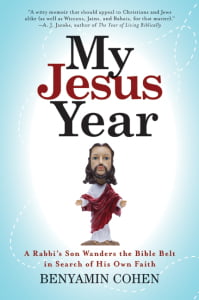 I love to read, but it always seems that time gets away from me and I'm unable to do so. I made reading a priority for Lent and found myself picking up Jesus Year by Benyamin Cohen a couple of weeks ago.
I love to read, but it always seems that time gets away from me and I'm unable to do so. I made reading a priority for Lent and found myself picking up Jesus Year by Benyamin Cohen a couple of weeks ago.
Just to give you a preview, the publishers describe the book this way:
One day a Georgia-born son of an Orthodox rabbi discovers that his enthusiasm for Judaism is flagging. He observes the Sabbath, he goes to synagogue, and he even flies to New York on weekends for a series of "speed dates" with nice, eligible Jewish girls. But, something is missing. Looking out of his window and across the street at one of the hundreds of churches in Atlanta, he asks, "What would it be like to be a Christian?"
So begins Benyamin Cohen's hilarious journey that is My Jesus Year—part memoir, part spiritual quest, and part anthropologist's mission. Among Cohen's many adventures (and misadventures), he finds himself in some rather unlikely places: jumping into the mosh-pit at a Christian rock concert, seeing his face projected on the giant JumboTron of an African-American megachurch, visiting a potential convert with two young Mormon missionaries, attending a Christian "professional wrestling" match, and waking up early for a sunrise Easter service on top of Stone Mountain—a Confederate memorial and former base of operations for the KKK.
During his year-long exploration, Cohen sees the best and the worst of Christianity— #8212;from megachurches to storefront churches; from crass commercialization of religion to the simple, moving faith of the humble believer; from the profound to the profane to the just plain laughable. Throughout, he keeps an open heart and mind, a good sense of humor, and takes what he learns from Christianity to reflect on his own faith and relationship to God. By year's end, to Cohen's surprise, his search for universal answers and truths in the Bible Belt actually make him a better Jew.
I was highly amused with Cohen's experiences in a faith that I've known all my life. (His chapter on visiting the World Wide Wrestling Congregation was the most dramatic). I was also annoyed that he visited churches that would be nothing like Washington Plaza and other like minded mainline churches. (Hey, I think places like WPBC have a lot to offer the faith community in our diversity, openness and acceptance). Yet, the truth that Cohen comes to find in the end-- that experiencing another faith actually made him a better Jew-- is a key to the type of Christians we are at Washington Plaza.
One thing I am was very impressed with this church when I first met its people and I continue to be impressed with now that I'm here is that we are a people who seeking to be deeply committed to the Christian path but at the same time fully respectful of the paths of other religious traditions. Though we may not always get things right, we are trying to be Christ centered in all we do knowing that any who join us from another faith tradition than ours may be strengthened in their beliefs by seeing us being true to ours.
Making the journey on the Christian path while at the same time not claiming that we are only ones who are right is an intentional decision. It is the path we are on at Washington Plaza. I'm happy to be along for the ride of all that this means for us.